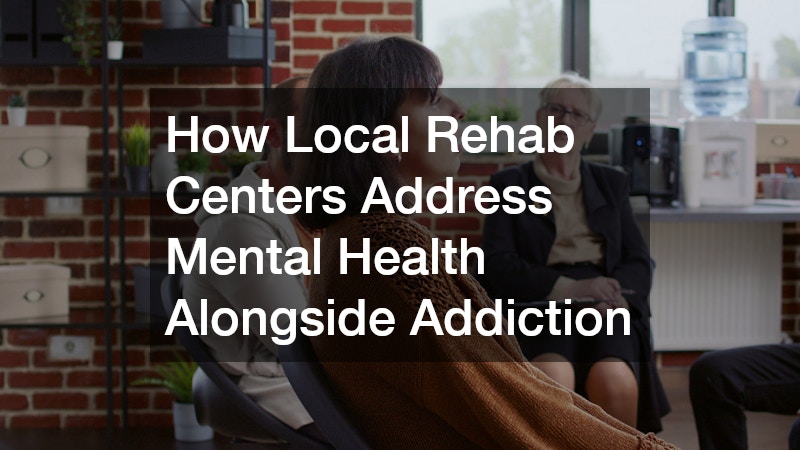This article explores the vital role that local rehab centers play in addressing mental health issues alongside addiction. Integrating mental health treatment with addiction recovery has become increasingly important as studies show the prevalence of co-occurring disorders. Local rehab centers are uniquely positioned to offer holistic care that addresses both addiction and mental health challenges.
The article will highlight common questions and concerns related to this integration, offering insight into therapies, support systems, and the role families play. By understanding these aspects, individuals and their families can be better prepared for the recovery journey.
How do local rehab centers integrate mental health treatment with addiction recovery?
Local rehab centers often employ a dual diagnosis approach, which is key to effectively treating individuals with co-occurring disorders. This approach recognizes that mental health and addiction are intrinsically linked and must be treated concurrently. By offering integrated treatment plans, centers can provide more comprehensive care that targets both the root causes of addiction and underlying mental health disorders. Moreover, this method reduces the risk of relapse because it tackles both issues side by side. This integrated approach dramatically improves the chances for long-term recovery.
Centers utilize a team of multidisciplinary professionals—including mental health specialists, addiction counselors, and medical staff—to create individualized treatment plans. This ensures that each patient receives personalized care suited to their specific needs. The collaboration among different specialists allows for comprehensive monitoring and adjustment of treatment plans as necessary. By keeping open lines of communication among specialists, patients receive a coordinated approach that is adaptable and responsive. Such a concerted effort is crucial for successful recovery.
What types of therapies are used in rehab for mental health and addiction?
Various therapeutic approaches form the backbone of treatment programs in rehab centers. Cognitive Behavioral Therapy (CBT) is one of the most commonly used therapies for treating both mental health disorders and addiction. CBT helps patients identify and change negative thought patterns and behaviors, offering strategies to cope with triggers and stressors. Dialectical Behavior Therapy (DBT) is another effective therapy, teaching patients emotional regulation and mindfulness skills. These therapies are often administered in combination with pharmacotherapy to offer a rounded treatment plan.
Group therapy sessions are also a staple in rehab settings, offering an environment where individuals can share experiences and gain insights from peers. These sessions are facilitated by licensed therapists who guide discussions, ensuring a safe and therapeutic space for all participants. Group therapy can be especially beneficial for those struggling with social anxiety or isolation, reducing feelings of loneliness. It fosters a sense of community and collective healing, which is vital for sustaining recovery efforts. Participants often report feeling understood and supported, which can significantly impact their mental health positively.
What role do support groups play in recovery at local rehab centers?
Support groups have long been a cornerstone of recovery and play an equally important role in addressing co-occurring disorders. Groups like Alcoholics Anonymous (AA) and Narcotics Anonymous (NA) provide a structured, safe space for individuals to find community and accountability. These groups operate on a principle of mutual support with members offering encouragement and practical advice. Participation in these groups has been shown to improve mental health outcomes significantly, in addition to helping maintain sobriety. Regular meetings provide opportunities for personal reflection and peer interaction, creating a sense of belonging and motivation to stay on track.
Beyond traditional 12-step programs, support groups specifically focused on dual diagnosis—such as Dual Recovery Anonymous—offer tailored support. These groups acknowledge the complexities that come with co-occurring disorders and focus on strategies that address both aspects. Facilitators often have specialized training in dual diagnosis, fostering an environment where members feel understood and validated. Such groups are invaluable for individuals facing challenges that mainstream support groups may not adequately address. They equip participants with targeted tools to manage their unique sets of challenges.
How can families support loved ones in rehab addressing both mental health and addiction?
Families play an essential role in the recovery process, serving as pillars of support and advocates for their loved ones. Understanding the complexities of dual diagnosis is the first step toward providing effective support. Families can become informed about co-occurring disorders through educational workshops and family therapy sessions, which are often integral components of rehab programs. These educational opportunities empower families to contribute positively to the recovery effort. They help dismantle misconceptions and equip family members with tools to offer better emotional and practical support.
Local rehab centers have become essential facilities in addressing co-occurring mental health issues and addiction, employing various therapies and support frameworks to ensure a holistic approach to recovery. By understanding and integrating both elements of recovery—mental health and addiction—these centers provide a more comprehensive treatment path. The combination of dual diagnosis treatment approaches, specialized therapies, and supportive family involvement enhances the likelihood of successful, long-term recovery. As more people become aware of these integrated strategies, the stigma surrounding dual diagnoses can be mitigated. Ultimately, a multi-faceted approach targeting both addiction and mental health drives the success stories emerging from local rehab centers, offering hope and healing to those in need.


